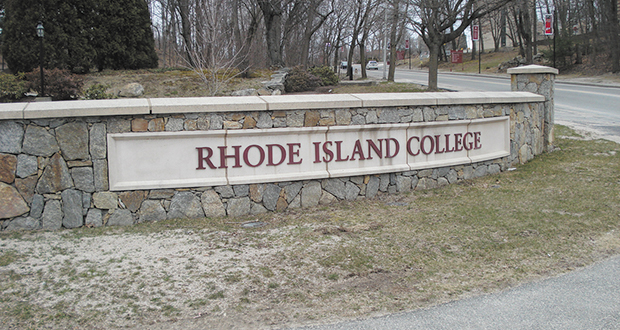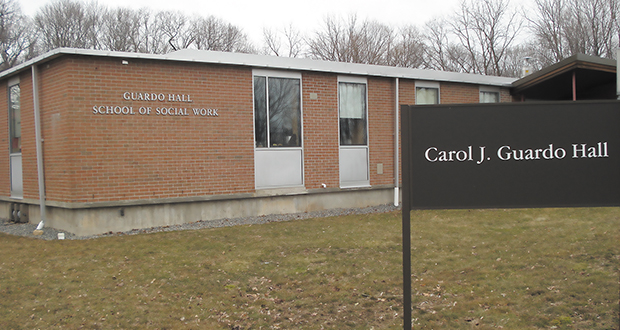 A former graduate student’s lawsuit claiming that Rhode Island College violated his rights to freedom of speech and expression and retaliated against him for his conservative viewpoints raises questions for a jury to decide and therefore should have survived the defendants’ motion for summary judgment, the R.I. Supreme Court has held in a 3-2 decision.
A former graduate student’s lawsuit claiming that Rhode Island College violated his rights to freedom of speech and expression and retaliated against him for his conservative viewpoints raises questions for a jury to decide and therefore should have survived the defendants’ motion for summary judgment, the R.I. Supreme Court has held in a 3-2 decision.
While pursuing a master’s degree at RIC’s School of Social Work, plaintiff William Felkner said the school violated his freedom of expression rights “on issues of political concern” and compelled him to “express ideas contrary to his political beliefs.”
Chief Justice Paul A. Suttell wrote for the majority in reviewing the trial judge’s grant of summary judgment for the defendants. He concluded that the record created factual questions on whether the school’s alleged actions were “reasonably related to legitimate pedagogical concerns” in line with the U.S. Supreme Court 1988 holding in Hazelwood School District v. Kuhlmeier.
“Viewing, as we must, the evidence most generously to Felkner, we are of the opinion that, in light of his avowedly conservative bent, genuine issues of material fact exist as to whether defendants’ justifications for their actions were truly pedagogical or whether they were pretextual,” Suttell wrote.
At the same time, summary judgment in favor of the defendants on other elements of the complaint was upheld, including counts asserting equal protection and procedural due process violations and conspiracy to violate civil rights. Suttell also turned away any possibility of punitive damages.
Concurring and dissenting in part were Justices Gilbert V. Indeglia and William P. Robinson III, who wrote separately.
The 60-page decision is Felkner v. Rhode Island College, et al.
Espousing political views
Thomas W. Lyons III represented the plaintiff in what he described as an “unusual” suit.
“By and large we are happy with the decision, as the main reason we filed was because of the First Amendment issues. Those are the claims that survived,” the Providence attorney said.
Lyons differentiated Felkner’s case from the kind of situation in which a student might fare better by not taking issue with a particular professor’s political ideology.
“In [Felkner’s] case, a whole lot of things piled up on each other,” he said. “A couple of different professors were telling him that he had to publicly advocate at the General Assembly for a position that the school favored, and that is the linchpin here.”
While under Hazelwood there is no doubt that an institution can require a student to argue a position with which that student does not agree, Lyons continued, a bright line of the holding is that a school cannot require a student to go out and lobby for that position outside of the classroom.
“But what gets murkier are situations like those at issue in this case, for example, when a student expresses his opinions and gets bad grades,” Lyons said. “It will be a jury question as to whether he was discriminated against in smaller ways because of his political perspective.”
Lyons added that there are not many suits of a similar nature across the country, as the conduct would have to be at a public university with fairly egregious results to justify the efforts of a lawsuit.
However, the decision in his client’s case could have broader implications, Lyons said.
“There is no doubt the entire school to varying degrees has a fairly socially progressive viewpoint, and according to one of the witnesses, that is a perspective that is mandated by both the National Association of Social Workers and the Council on Social Work Education, the accrediting agency,” Lyons said. “If that’s true, then in theory this decision affects all of the social work schools across the country, i.e., they cannot require their students to espouse these political perspectives.”
Higher education attorney John J. Cloherty III, who practices in both Rhode Island and Massachusetts, fell more in line with the dissenting opinion of Robinson, who wrote that the suit “involves at bottom nothing more than some petty academic squabbles and certainly nothing of constitutional magnitude.”
Cloherty said the majority seemed to be finding disputed facts based on the size and complexity of the record.
“One unusual aspect of the decision is that the court relies on an affidavit from an expert of the plaintiff to support a showing of disputed facts,” he said. “I’ve of course seen that in medical malpractice cases, where there may be disagreement among experts as to what caused an injury, but I haven’t seen it in a First Amendment case in the academic context.”
But the ruling makes clear that the First Amendment does not require educators to change their work to be consistent with their students’ opinions, Cloherty said.
“In academic circles, discretionary decisions such as grading do not implicate the First Amendment,” he added.
Cloherty also noted, as Suttell acknowledged, that Hazelwood’s application to a university setting is still an open question, as that case involved high school students and the U.S. Supreme Court was silent on the matter.
Neither of the defense attorneys, Jeffrey S. Michaelson of North Kingstown and Timothy J. Dodd of Providence, responded to a request for comments by press time.
Competing ideologies
Plaintiff William Felkner, a self-described “conservative libertarian,” entered the master’s program at the Rhode Island College School of Social Work in 2004. He soon clashed with what he termed the school’s “distinct sociopolitical ideology.”
For example, according to Felkner, professors stated the school had a “mission dedicated to social and  economic justice” and that “Republican ideology is oppositional to the [social work] profession’s fundamental values.”
economic justice” and that “Republican ideology is oppositional to the [social work] profession’s fundamental values.”
Felkner further complained that during a group exercise, he was told by professor James Ryczek that he could not argue against the passage of legislation concerning temporary cash assistance to state residents. When he nevertheless did so, he received a failing grade on both his written assignment and classroom debate for not following assignment directives.
An appeal of the failing grades to the school’s Academic Standing Committee was unsuccessful, but because he thought Ryczek had given inaccurate testimony at the hearing, Felkner decided to start recording his conversations with RIC professors. After an ethics complaint, he was later directed by the ASC to do so only with the consent of those being recorded.
Felkner’s problems continued the next semester when professor Roberta Pearlmutter nixed Felkner’s proposals to work on certain projects, including his idea to lobby at the General Assembly for the defeat of the cash assistance legislation, contrary to the school’s position on the bill.
At the end of the program’s first year, Felkner encountered friction from the school as he arranged his field placement and his integrative project, both requirements for his degree. He said that the school initially rejected an internship he had secured working on welfare reform for then-Gov. Donald L. Carcieri’s office, “as it would not advance [his program’s] objectives of promoting progressive social change.”
Ultimately, after receiving an extension of time to complete his integrative project, Felkner did not meet the degree requirements in a timely manner and was dropped from the program.
Felkner filed the instant action in 2007 against Rhode Island College, Ryczek, Pearlmutter and other school officials.
However, in 2015, Superior Court Judge Netti C. Vogel concluded that none of the claims presented a genuine issue of material fact and entered summary judgment in favor of the defendants on all counts.
‘Tenable claims’
While affirming summary judgment on the equal protection, due process and conspiracy counts, the majority held that Felkner’s free speech and expression claims should go to a jury.
Suttell first pointed out that Hazelwood established that rights guaranteed under the First Amendment are not unlimited in the academic environment, where institutions are granted wide latitude to further curricular objectives.
“Hazelwood stands for the proposition that ‘educators do not offend the First Amendment by exercising editorial control over the style and content of student speech in school-sponsored expressive activities so long as their actions are reasonably related to legitimate pedagogical concerns,’” Suttell wrote.
And with an affidavit from one of Felkner’s witnesses saying that the alleged conduct would “constitute a substantial departure from the norms of academic debate and scholarship that should prevail at colleges and universities,” Suttell said there were questions of fact as to whether the defendants’ actions would pass muster under the Hazelwood test.
“The record in this case is voluminous and replete with disputed facts,” Suttell wrote. “Resolving all such facts in the light most favorable to Felkner, the issue is whether he has made tenable claims that defendants have violated his constitutional rights to free speech and expression. We believe that he has.”
“Given the broad discretion afforded to educational institutions, [Felkner] may have a difficult road ahead of him,” Suttell continued. “Nevertheless, he has raised genuine issues of material fact concerning whether the actions of defendants are ‘reasonably related to legitimate pedagogical concerns’ or merely a pretext for punishing him for his conservative views.”
And, while a student may be required to debate a topic from a perspective that is contrary to his or her own views, a more “tenuous” situation is presented, Suttell said, when that person is “told that he or she must lobby for that position in a public forum or that his or her viewpoint is not welcome in the classroom because it is contrary to the majority viewpoint of the students and faculty.”
On the counts concerning retaliatory conduct, Suttell said the school’s requirement that Felkner stop taping classroom discussions and conversations with his instructors was a reasonable condition in the context of higher learning and therefore affirmed that piece of Vogel’s judgment.
However, the other alleged acts of retaliation, such as the school supporting verbal attacks against his views or attempting to require him to lobby the General Assembly in support of political positions he opposed, presented issues of material fact and were remanded.
 New England Biz Law Update
New England Biz Law Update
